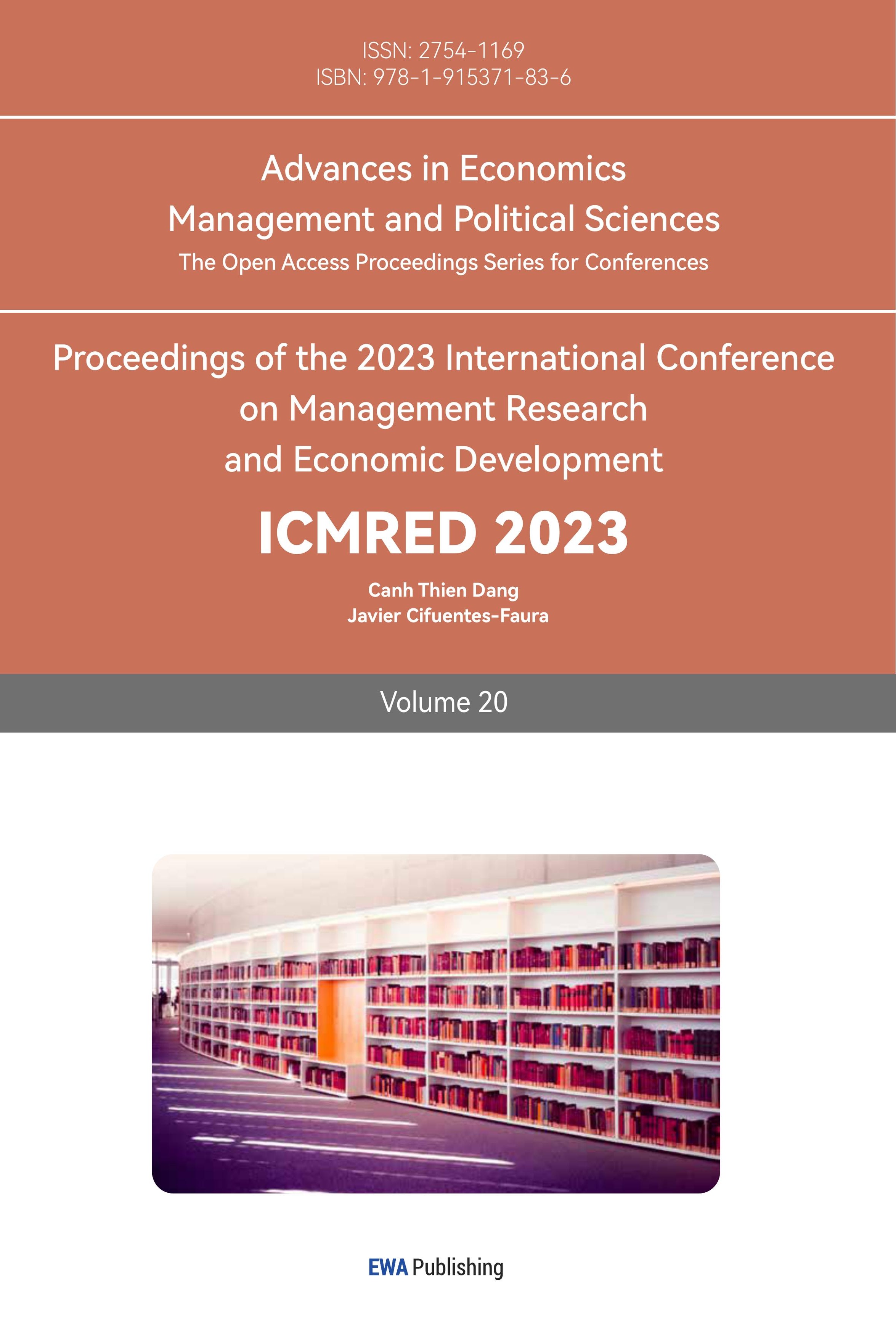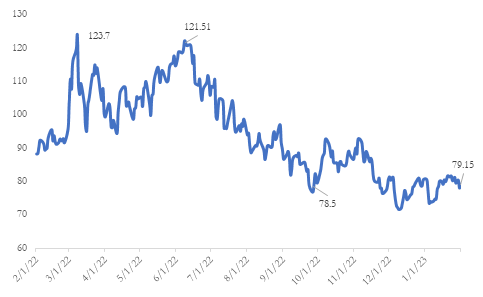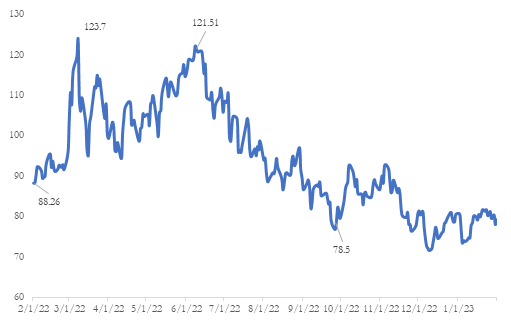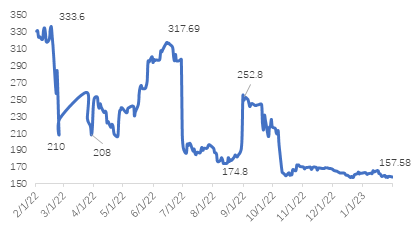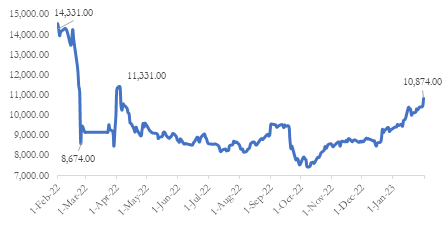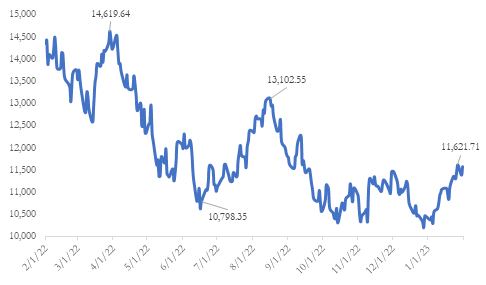1. Introduction
With the Russo-Ukrainian war continuing, it’s impacts on the world economy becomes more and more profound and important. As essential footstones of the world economy, energy markets and manufacturing, financial markets, and crop markets have all been greatly affected. The global energy prices have skyrocketed. Stimulated by the war, Russian military-industrial complex enterprises developed further with government assistance. The global financial markets have also become unstable. As the war escalated, Western countries, led by the United States, tightened sanctions against Russia. In response, Russia's grain exports to other countries have gradually decreased. Ukraine's wheat feeds a large part of the world's population, but the war has also had an impact on Ukraine's food production. For countries in the Middle East and North Africa region (MENA), because their food is dependent on imports, their food systems became even more vulnerable because of changes of Russian food policies. These macroeconomic events not only have a profound and lasting impact on the world economy, but also have a huge impact on the consumption, investment and even survival of everyone because it’s them who will pay for higher energy prices, volatile stock markets, higher food prices, and even the "price" of war. To understand tremendous effects this war has on world, it is vital to know how this war affect the energy markets and manufacturing industries, financial markets, and crop markets.
This paper attempts to analyze the impact of the Russo-Ukrainian war on the world economy from three perspectives: energy and manufacturing, financial markets, and agricultural product markets. In energy and manufacturing, oil and gas prices have risen as a result of the war. In terms of oil, the rise in Brent crude oil and WTI oil prices is taken as an example to analyze the impact of the war on international oil prices. In terms of natural gas, taking the rise in prices of Russia's domestic gas company Gazprom as an example, it analyzes how the turbulent international situation under the Russian-Ukrainian war affects the survival of Russia's domestic gas companies. As one of the important industrial pillars of Russia, the manufacturing industry takes Russia's military enterprises as an example to analyze the impact of the Russo-Ukrainian war on Russia's manufacturing industry. Stimulated by the war, Russia's own military enterprises received government assistance, and the number of equipment and technical level have increased. hoping to provide some suggestions for investors from all over the world. In terms of financial markets, the Russian stock market, the US NASDAQ stock market and the Chinese stock market are used as examples to analyze the impact of the Russian-Ukrainian war on the world financial market, hoping to provide some suggestions for investors from all over the world to optimize asset portfolios. In terms of agricultural markets, wheat is used as an example to analyze the impact of the Russia-Ukraine war on the world's food supply chain. By exploring agricultural markets, it can help people better cope with the food crisis.
The remaining parts of the paper are arranged as follows: section 2 analyzes the dynamic changes in energy markets and manufacturing; Section 3 analyzes the fluctuations of financial markets; section 4 analyzes in agricultural markets; the global food supply chain can be affected by the shortage of wheat.
2. Energy Markets and Manufacturing Industries
With the escalation of Russo-Ukrainian war, the world’s energy markets and manufacturing industries are deeply affected. When Russia began to decrease the supplies of pipeline gas, lots of countries who depends on Russian gases, will face some energy crises. Some companies are also victims of the war. Germany’s largest importer of natural gas, Uniper, sent a request to German government for emergency assistance [1]. To understand how energy markets will change, it’s necessary for us to understand how prices of petroleum and natural gas will change. In manufacturing, some western countries tightened sanctions against Russia, making the situation of Russia’s manufacturing industries more and more difficult. But Russia's military-industrial complex, spurred on by the war, received government aid. The output and quality of its equipment have improved.
2.1. Petroleum
Due to the outbreak of Russo-Ukrainian war, Russia is sanctioned by Europe and the United States. As a result, Russia cannot settle in EUR/USD, which leads to the rise of prices of Russian petroleum and even global inflation. As the world's second largest oil producer, Russia's reduced oil supply to other countries, which has also greatly affected the energy security of other countries. On the other hand, since Ukraine is one of the major energy transport countries, this protracted war will definitely lead to the fluctuations of prices of some major oil companies, such as Brent oil. Brent oil is one of the major oil companies in the world with its headquarter in London. It can be seen from Figure 1 that after Russo-Ukrainian war broke out, the prices of Brent oil have decreased dramatically. The war between Russia and Ukraine has had a significant impact on the global Brent crude oil market. Brent crude oil is the most important oil currency in the world, so any factor that affects its production and circulation can have a significant impact on the global economy. After the start of the Russo-Ukrainian war, crude oil production in eastern Ukraine has decreased, as the war has caused damage to oil production facilities in the region. At the same time, Russia is the world's second largest crude oil producers, which will have a significant impact on its crude oil production and exports if the country is subject to international sanctions. In addition, due to the uncertainty of the Russo-Ukrainian war, global investors' demand for Brent crude oil has decreased, and crude oil prices have fallen. Because crude oil is a high-risk investment, as the war escalates, investors dare not invest on a large scale, resulting in a decline in the price of Brent crude oil. “In volatile periods, the causality between the stock markets and oil prices is more evident and that both exporting and importing crude oil countries are influenced on the same level” [2]. This fully illustrates the uncertainty of the Russo-Ukrainian war. At the same time, the Russo-Ukrainian war has also had an important impact on the Asian market. Asia is the world's largest crude oil import market, due to the Russian-Ukrainian war, the region's crude oil supply has decreased, and crude oil prices have risen, thus affecting Asian economic growth.
|
Figure 1: Prices of Brent oil. |
Data source: Investing |
Photo credit: Original |
Other than Brent oil, another major oil company, WTI, is also deeply affected. WTI crude oil is one of the most commonly used crude oil price benchmarks in the world. The conflict has raised concerns about oil supplies in the region and the impact on global oil markets, causing oil prices, including WTI, to rise on increased political risk and uncertainty. The Russia-Ukraine war has led to disruptions in oil production and exports in the region, further exacerbating upward pressure on oil prices. Russia and Ukraine are estimated to be important oil exporters, so production and export disruptions caused by the conflict could have an impact on global oil supplies and further boost WTI prices (please see Figure 2). In addition, the conflict had a negative impact on the economies of Russia and Ukraine, leading to lower oil demand, which further boosted WTI prices. The Russian-Ukrainian war has not only affected the region's economy, but has also led Western countries to impose sanctions on Russia, further dragging down the region's economic growth and leading to a decline in oil demand. Therefore, the Russia-Ukraine war has had a significant impact on WTI crude oil prices, and in the current market situation, it is necessary to pay attention to the conflict situation in the region to determine the trend of WTI prices. Higher oil prices hit global consumer confidence, which further depressed the world economy.
|
Figure 2: Prices of WTI. |
Data source: Investing |
Photo credit: Original |
2.2. Natural Gas
Since the post-Soviet era, Russia and Ukraine have also become more closely linked. Russia is the world's second largest producer of natural gas, and Ukraine is the main exporter of Russian natural gas. However, due to geopolitical and national interests, the two countries have clashed over natural gas. Before the Russo-Ukrainian war, there were “gas wars” between Russia and Ukraine that had already existed. One of them is in “2006”, another one is in “2009”. Because of the fragility of the economic systems of both countries, the international financial crisis could easily affect them deeply. In 2008, the financial crisis that swept the world was also one of the important reasons for the rise in Russian gas prices in 2009. Because of the financial crisis, Russia, whose economy had been growing at 6%-8% annually for 6 years, was heading into recession. In Ukraine, GDP would fall by an estimated 15% in 2009 [3]. In both of the “gas wars”, Russia's attempts to raise the price of gas delivered to Ukraine have raised concerns about energy security in Europe. Although Russia and Ukraine finally reached an agreement due to the influence of international media and political pressure, the open and secret battle between the two countries over gas prices has not ended. As the Russian-Ukrainian war continues to escalate, many European countries have begun to seek energy independence and reduce their dependence on Russian natural gas. A professor at King’s College London even predicted that the Russo-Ukraine war “will be seen to have accelerated Europe’s transition to a lower carbon economy” (please see Figure 3) [4]. For Gazprom, Russia's own gas company, the war also sent its stock index lower. As Russia's main exporter, much of Gazprom's gas is shipped to Europe through pipelines from Ukraine. Due to tensions between Ukraine and Russia, Gazprom faces a lot of problems in transporting gas. The Ukrainian government no longer allows Gazprom to transport gas through its territory, which has forced Gazprom to find other avenues and has led to an increase in the cost of its transportation. In addition, Gazprom faces political pressure and economic sanctions from the EU as relations between Russia and the EU have also become strained. This made it difficult for Gazprom to sell its products in the European market and negatively affected its business. For consumers, they should be mindful of policy changes and respond to rising gas prices by saving energy, finding alternative energy sources, reducing energy waste, and finding more competitive suppliers.
|
Figure 3: Prices of Gazprom PAO. |
Data source: Investing |
Photo credit: Original |
2.3. Manufacturing Industries
The Russo-Ukrainian war has had a huge impact on Russia's manufacturing industry, and has also caused the loss of labor to a certain extent. This war even affected the supply of global industrial raw materials, such as steel and copper. However, in this war, Russia's military industry is most directly affected. In general, the impact of the war on Russian military-industrial complex enterprises is positive. The Russo-Ukrainian war has the following positive effects on the Russian military industry. First, the Russo-Ukrainian war has increased the demand for military equipment in the Russian army, which has brought growth opportunities to Russia's military-industrial complex. Second, Russian military-industrial enterprises need to continuously improve their technical level when producing military equipment, which can drive the technological progress of military-industrial enterprises. According to Dmitry Rogozin, former president of Roscosmos, said that four Russian-made "Marker" robots will be delivered in February, and they will be put into combat use after a series of tests [5]. Third, the Russo-Ukrainian war can allow Russian military-industrial enterprises to gain more market share, thereby improving their competitiveness. Fourth, the Russian government may invest in military-industrial complex enterprises to increase the production capacity of military equipment, thereby positively impacting military-industrial complex enterprises.
3. Impacts on Financial Markets
Before the Russo-Ukrainian war, the world's major financial markets were closely connected. Influenced by the international financial system and globalization, this link is achieved through international trade, investment and capital flows. Transnational corporations and financial institutions invest and operate in different financial markets and move capital between different markets. However, since the Russo-Ukrainian war broke out, “the relationship among financial assets has changed, as depicted by the shift in net time-varying connectedness approaches, allowing us by the shift in net-time varying connectedness and transitory and permanent…” [6]. First, the conflict has led to economic and investment instability and volatility in global financial markets. For example, when the conflict escalated, the Russian ruble depreciated sharply, and many investors chose to transfer their funds to the dollar, gold, and other safe assets to avoid risk. Second, conflict could affect the region's economic growth and, in turn, its contribution to global economic growth. Ukraine is an important economy in Europe, and Russia is the world's second-largest oil and gas producer. As a result, conflict could lead to economic recession in the region, which in turn could affect global economic growth. In addition, conflict can affect investment in the region, which in turn affects the global investment climate. If investors are uneasy about the risks of investing in the region, they may abandon their investment plans, which in turn will affect the region's economic growth. We will discuss in detail about how the Russo-Ukrainian war affects stock markets in Russia, United States and China.
3.1. Changes in Russia’s Stock Market
Since the outbreak of the Russian-Ukrainian war, some countries led by the United States have increased financial sanctions against Russia, and the Russian financial market has been hit hard. A series of economic restrictions imposed by the U.S. government on the Russian financial sector, government officials, and other associated individuals and entities. These sanctions are aimed at punishing the Russian government for misconduct in Ukraine and elsewhere, and have an impact on the Russian financial system. Specifically, U.S. financial sanctions against Russia include a ban on doing business with some key Russian banks and financial institutions, as well as a ban on providing funds and financial services to a number of Russian government officials and other individuals and entities. With the escalation of a series of sanctions, Russia's stock index fell further. In the face of the escalation of US financial sanctions, Russia has also taken multiple countermeasures, such as strengthening the top-level design, seeking decoupling from the US dollar, taking the initiative to decouple from the US market, improving financial infrastructure, maintaining financial market stability, and broadening international financing channels have greatly eased the impact of financial sanctions (please see Figure 4) [7].
|
Figure 4: Prices of Moscow Exchange Equity Futures. |
Data source: Investing |
Photo credit: Original |
3.2. Changes in the NASDAQ Market
The Russian-Ukrainian war has had a certain impact on US finance. First, stock market volatility. The Russo-Ukrainian war has triggered uncertainty in global financial markets, leading to stock market volatility, especially as Russia is sanctioned and sanctions are strengthened. Second, oil prices fluctuate. Russia is one of the world's largest oil exporters, and the war could cause oil prices to fluctuate, which could affect the American economy. Third, the currency market. The Russo-Ukrainian war has had an impact on international currency markets such as the dollar and the euro, which can lead to exchange rate fluctuations. Fourth, foreign investment. The investments of American companies in Russia could be affected, which could also affect the U.S. economy. The Nasdaq index is one of the important indicators that global stock market investors pay attention to, and it can be used as an important indicator to measure the performance of the US economy and investment environment. As the Russian-Ukrainian war continues to escalate, the Nasdaq index has also fallen sharply (please see Figure 5). According to a research, “the US stock market was a volatility transmitter before the conflict and turned into a volatility receiver during the conflict” [8]. In general, even though the Russo-Ukrainian war has created many spillover effects, US stock markets is still one of the main net receivers of the shocks, once again highlighting the safe-haven nature of gold in the global crisis period [8].
|
Figure 5: NASDAQ Composite Index. |
Data source: Investing |
Photo credit: Original |
3.3. Changes in the Chinese Stock Market
Under the Russian-Ukrainian war, although China's stock market is still affected to a certain extent, it has shown a positive momentum overall. The CSI 300 Index is an important tool for investors to understand the performance of China's stock market, as well as an important indicator to assess China's economic growth and investment opportunities. From Figure 6, it can be seen that although the CSI 300 Index was affected when the Russian-Ukrainian war broke out, the overall situation of the CSI 300 Index is still stable and good due to the stability of China's economic environment and China's good investment environment. “After a turbulent February, March, April, international investors appear to be returning to Chinese equities” [9]. In February, first the situation in Russia and Ukraine continued to heat up, the epidemic in many places in China began to repeat in March, Shanghai entered static management in April, supply chain disruption caused market concerns, while the Fed's monetary tightening stance became more and more hawkish, a series of problems affected market risk sentiment, northbound funds continued to flow out, emerging market stocks and bonds sold off. However, after April, China's stock market development has returned to positive momentum. On June 6, northbound funds flowed 11.244 billion yuan [9]. International money rushed to grab China's stock market, and just six trading days after January, 2023, northbound funds poured in 33.52 billion yuan [10].
|
Figure 6 SSEC. |
Data source: Investing |
Photo credit: Original |
4. Crop Markets
The likely impact of the Russia-Ukraine war on the wheat market depends on a variety of factors, including the impact of the war on production and trade, the economic situation, and market expectations. If the war causes damage to wheat-producing areas, this could have an impact on wheat supplies, pushing up wheat prices. If the war affects the transportation and sale of wheat, this may also have an impact on the wheat market. Some 26 countries around the world get more than half of their wheat from Russia and Ukraine, says Arif Husain, chief economist at the UN World Food Programme. “If this war doesn’t get sorted out in the next couple of weeks, things will get even worse,” Husain says. “That means Ukraine will not be able to plant corn. The winter wheat in the ground will not be fertilized, and the harvest sharply reduced. That’s a real danger. They are a country of 40 million people, but they produce food for 400 million. That’s the reality of a globalized world. We are all in this together” [11]. In addition, the war could have an impact on the global economy and investment climate, which in turn could affect the wheat market. For example, if the war leads to economic instability, this may affect investor confidence in the wheat market, which in turn will affect wheat prices. In conclusion, the impact of the Russo-Ukrainian war on the wheat market is complex and depends on many factors, so a comprehensive assessment of the current situation is needed to understand the specific impact of the Russia-Ukraine war on the wheat market (see Figure 7).
|
Figure 7: Prices of Wheat (USD/60lb). |
Data source: Choice Financial Terminal |
Photo credit: Original |
5. Conclusion
As a result, it can be seen that Russia-Ukraine war impacts the world economy in many aspects. This paper discusses the impact of the Russia-Ukraine war on the world economy from three aspects: energy and manufacturing, financial markets, and agricultural product markets. This paper found that for energy markets and manufacturing, the prices have increases over time. For financial markets, stock prices become increasingly unstable. For crop markets, the prices of the products are also increasing. The turbulent international situation has made investors less confident, and Russian capital has fled in large numbers. Energy markets, manufacturing, financial markets, and agricultural markets were all affected by the war. The world economic situation is generally in a slump. However, countries are still actively seeking countermeasures to mitigate the negative impact of the Russo-Ukrainian war. In the face of sanctions from Western countries led by the United States, Russia's counter-sanctions have eased the sluggish domestic economy. United States is still a direct beneficiary in this war. China's economic environment is generally stable and improving, making it an ideal place for many investors. After months of fighting, prices in the energy market, manufacturing, financial markets, and agricultural markets have gradually stabilized. It is recommended that consumers and investors in all countries maintain confidence in the world economy.
References
[1]. S.S. Fan. (2022) An oil and gas bankrupt under the Russia-Ukraine war. Energy. 47-48.
[2]. C. Basdekis, A. Christopoulos, I. Katsampoxakis, (2022) The impact of the Ukrainian war on stock and energy markets: a wavelet coherence analysis. J. Energies. 15(21): 8174.
[3]. S. Pirani. (2012) Russo-Ukrainian gas wars and the call on transit governance. J. Dynamics of energy governance in Europe and Russia. 169-186.
[4]. N. Butler. (2022) The impact of Ukraine war on global energy markets. https://www.cer.eu/insights/impact-ukraine-war-global-energy-markets.
[5]. China Youth Network. (2022). The Russian side said it would send combat robots to deal with Western tanks. http://news.youth.cn/js/202301/t20230127_14279385.htm.
[6]. Z. Umar, O. Polat, SY. Choi, T. Teplova. (2022) The impact of the Russia-Ukraine conflict on the connectedness of financial markets. J. Finance research letters. 48:102976.
[7]. F. Xia, P. Lin, Z.Y. Wang, H. Wang. (2022) Financial Sanctions and Counter-sanctions: The U.S.-Russia Game and Implications. Hebei Finance. 33-37.
[8]. Y. Li, M.M. Alshater, S.M. Yoon. (2022) The impact of Russia-Ukraine conflict on global financial markets. J. Available at SSRN 4108325. https://papers.ssrn.com/sol3/papers.cfm?abstract_id=4108325.
[9]. A.L. Zhou. (2022) Global investors are returning to Chinese equities. CBN Daily. A03.
[10]. A.L. Zhou. (2022) International hedge funds start the year with a rush to grab China's stock market. CBN Daily. A08.
[11]. J.K. Bourne (National Geographic). (2022). War in Ukraine could plunge world into food shortages. https://www.nationalgeographic.com/environment/article/war-in-ukraine-could-plunge-world-into-food-shortages.
Cite this article
Bai,J. (2023). The Impacts of Russo-Ukrainian War on World Economy: Energy, Finance and Crop Markets. Advances in Economics, Management and Political Sciences,20,321-331.
Data availability
The datasets used and/or analyzed during the current study will be available from the authors upon reasonable request.
Disclaimer/Publisher's Note
The statements, opinions and data contained in all publications are solely those of the individual author(s) and contributor(s) and not of EWA Publishing and/or the editor(s). EWA Publishing and/or the editor(s) disclaim responsibility for any injury to people or property resulting from any ideas, methods, instructions or products referred to in the content.
About volume
Volume title: Proceedings of the 2023 International Conference on Management Research and Economic Development
© 2024 by the author(s). Licensee EWA Publishing, Oxford, UK. This article is an open access article distributed under the terms and
conditions of the Creative Commons Attribution (CC BY) license. Authors who
publish this series agree to the following terms:
1. Authors retain copyright and grant the series right of first publication with the work simultaneously licensed under a Creative Commons
Attribution License that allows others to share the work with an acknowledgment of the work's authorship and initial publication in this
series.
2. Authors are able to enter into separate, additional contractual arrangements for the non-exclusive distribution of the series's published
version of the work (e.g., post it to an institutional repository or publish it in a book), with an acknowledgment of its initial
publication in this series.
3. Authors are permitted and encouraged to post their work online (e.g., in institutional repositories or on their website) prior to and
during the submission process, as it can lead to productive exchanges, as well as earlier and greater citation of published work (See
Open access policy for details).
References
[1]. S.S. Fan. (2022) An oil and gas bankrupt under the Russia-Ukraine war. Energy. 47-48.
[2]. C. Basdekis, A. Christopoulos, I. Katsampoxakis, (2022) The impact of the Ukrainian war on stock and energy markets: a wavelet coherence analysis. J. Energies. 15(21): 8174.
[3]. S. Pirani. (2012) Russo-Ukrainian gas wars and the call on transit governance. J. Dynamics of energy governance in Europe and Russia. 169-186.
[4]. N. Butler. (2022) The impact of Ukraine war on global energy markets. https://www.cer.eu/insights/impact-ukraine-war-global-energy-markets.
[5]. China Youth Network. (2022). The Russian side said it would send combat robots to deal with Western tanks. http://news.youth.cn/js/202301/t20230127_14279385.htm.
[6]. Z. Umar, O. Polat, SY. Choi, T. Teplova. (2022) The impact of the Russia-Ukraine conflict on the connectedness of financial markets. J. Finance research letters. 48:102976.
[7]. F. Xia, P. Lin, Z.Y. Wang, H. Wang. (2022) Financial Sanctions and Counter-sanctions: The U.S.-Russia Game and Implications. Hebei Finance. 33-37.
[8]. Y. Li, M.M. Alshater, S.M. Yoon. (2022) The impact of Russia-Ukraine conflict on global financial markets. J. Available at SSRN 4108325. https://papers.ssrn.com/sol3/papers.cfm?abstract_id=4108325.
[9]. A.L. Zhou. (2022) Global investors are returning to Chinese equities. CBN Daily. A03.
[10]. A.L. Zhou. (2022) International hedge funds start the year with a rush to grab China's stock market. CBN Daily. A08.
[11]. J.K. Bourne (National Geographic). (2022). War in Ukraine could plunge world into food shortages. https://www.nationalgeographic.com/environment/article/war-in-ukraine-could-plunge-world-into-food-shortages.





